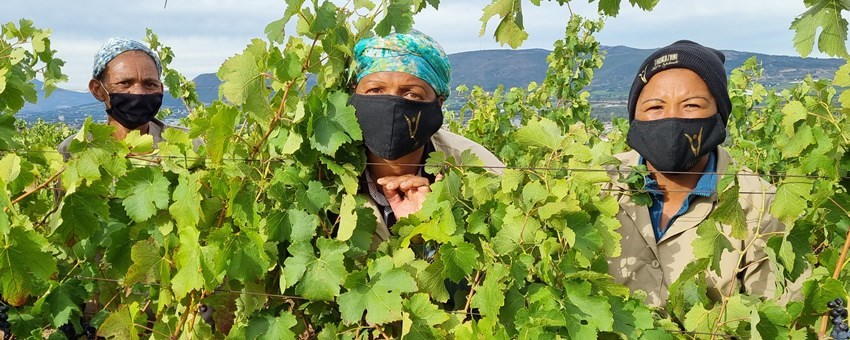The SA Wine Industry Transformation Unit (SAWITU) was established to enable meaningful participation of black-owned wine businesses and is at the forefront of transformation in the wine industry. SAWITU represents transformation on various forums, work groups and industry bodies. Its strategic priorities are enterprise development, skills development, ownership and aocial development.
The enterprise development programmes include financial assistance, opportunities for market access in local and international markets, promotional activities and start-up mentorship programmes. These mentorship programmes cover business strategy and marketing plans, registration of liquor licences, financial management and trademark registration which assist start-up wine enterprises with the legislative requirements to be trade ready. SAWITU has a Service Level Agreement with Vinpro and the Department of Rural Development and Land Reform to assist black-owned farms with technical and viticultural support.
Skills development is facilitated at different levels within the industry. The aim is to uplift black people and increase their representation in wine cellars and wine businesses through people development programmes. The Leadership, Communications and Relationship Training Programme is designed to address the scarcity of skills amongst managers, supervisors and workers on farms in order to enhance a healthy work culture. SAWITU collaborates with trade unions and funds projects aimed at training farm and cellar workers.
A key objective of SAWITU’s strategic vision is to develop partnerships and collaboration between various role-players in order to leverage available funding. With limited funding, the organisation has partnered with well-matched stakeholders that provide the same drive and support to black-owned enterprises and farmworker programmes. To maximise black participation of service providers in the sector, SAWITU is compiling a database of Level 1 and 2 B-BBEE enterprises as well as service providers in the wine value chain to ensure preferential procurement.
The ethical trade programmes that SAWITU supports via the Wine and Agricultural Trade Association (WIETA) serves to enhance the skills and insights of producers, brands and workers towards better and more sustained implementation of socially responsible workplaces.
Social development initiatives is undertaken by SAWITU to develop farm worker communities and enable previously disadvantaged students to enter the industry.

Future plans
The key pillars that SAWITU will focus on, in line with the NAMC guidelines of 2017, include: Ownership, Management and Control, Enterprise Development, Skills Development and Socio-economic Development.
The lack of a shared vision and holistic approach by industry stakeholders and role-players is delaying progressive transformation. The industry is not representative of an inclusive democratic South Africa and this is evident throughout the wine value chain.
Black-owned brands and businesses as well as farms are still faced with key challenges that have been addressed in several reports done over the years. These challenges are obstacles towards sustainable economic growth for the wine industry.
Priority areas for this Transformation Strategy include:
- Equitable access to land, infrastructure, cellar with warehouse facilities, manufacturing assets distribution
- Specific market access opportunities and ventures
- Serviced land with water rights
- Conferencing and tourism facilities to actively benefit from Tourism
- Transformation regarding the broader value chain, which should include preferential procurement policies
- Skills development and learning programmes
- Socio-economic development initiatives and programmes
Among farmworker and farmworker communities, social challenges remain part of their daily lives, which includes poor health, alcohol and drug abuse, gender violence, poor housing and living conditions, unemployment, illiteracy and lack of specialised skills. The COVID-19 pandemic has placed more focus on these social ills and they have become even more visible in society, industry and government.
In the implementation of these activities and programmes a clear measure and evaluation process, procedure and reporting must be implemented. Clear KPIs must be set, which will include measurable targets that are realistic, achievable and that are timeline sensitive. Accountability will be with all wine industry stakeholders, government, business units and labour to actively drive the transformation.
A key objective for SAWITU’s strategic vision is to develop partnerships and collaboration between various stakeholders in relation to SAWITU’s mandate. SAWITU’s role is in the form of an influencer in terms of providing guidance to policy issues and directing the transformation agenda for the industry. Most importantly, SAWITU’s role is that of change agent in terms of actioning projects and interventions that will result in inclusive transformation of the industry. This will ensure that we leverage available funds and resources for transformation in order to better support initiatives offered to black-owned businesses, black-owned farms, farmworkers and black professionals. The goal is to identify areas of partnership where different role-players in the sector can collaborate to maximise support and leverage our available funds.

There are plenty of good news stories about upliftment and transformation in the South African Wine Industry. The #wineforgood website, launched by wine.co.za in June 2016, hosts all the positive stories from the winelands, of which there are plenty. wine.co.za has made April a focus for #wineforgood stories. Share them far and wide and spread the good news about South African wine.